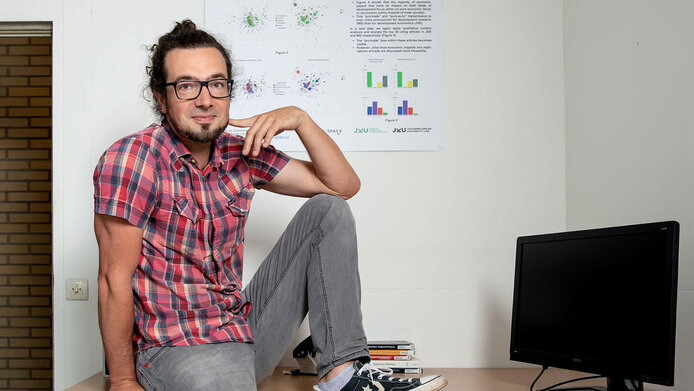How concepts of economics hinder societal change

What answers do you expect your project to provide?
In economics, the idealized assumption goes like this: Actors act rationally as they are guided by cost-benefit considerations. Economic growth is the only factor that can bring about human progress, and markets always generate the most efficient outcome. This thinking has found its way into everyday life as evidenced in phrases like, “I'm not buying it.” It also pervades research, university education and politics and impedes socio-ecological transformation at many levels.
Can you cite an example?
Yes, take short-haul flights. Textbook economics, and also a majority of economists, say that ticket prices should be increased and that it is up to each individual to decide whether they want to pay. From an economics point of view, issues of a political regulatory nature and bans are mostly seen as subordinate or are problematized. Yet socio-ecological change requires fundamental change, not just minor tweaking.
In economics the social, societal, political and academic impact that thought processes have is still hardly part of the equation. That is why I plan to apply an interdisciplinary perspective to identifying how economic analysis works and where it falls short. Our climate and biodiversity crises as well as the rich-poor divide will not be resolved if we fail to include them in economic analyses.
Stephan Pühringer is Deputy Director of the Research Institute for the Comprehensive Analysis of the Economy at Johannes Kepler University (JKU) Linz and currently coordinates the interdisciplinary FWF research project Spatial Competition and Economic Policies: Discourses, Institutions and Practices (SPACE). After receiving his PhD in economics, he worked as a postdoctoral researcher at Cusanus University in Koblenz. Mr. Pühringer has already received a number of grants for his research activities.
It is logical that the limits to economic activity are ecological. A social and ecological rethinking intersects with many other disciplines. In my project, I will collaborate in an interdisciplinary way with sustainability studies researchers in a completely new approach.
What will your first steps be?
I will work with a colleague who is an expert in sustainability science to define the analytical framework. We will determine which of the many concepts of sustainability and socio-ecological transformation we will include, for example CO2 pricing, doughnut economics, or degrowth approaches.
I will also work with the ZOE Institute for Future-fit Economies on the question of how politically effective it is to take an economic approach, using concrete examples. ZOE holds workshops with politicians and stakeholders in Germany and at the EU level, for example on the EU Green Deal. Similar workshops are also planned within the framework of my project.
By the way, we are also looking to develop and release a podcast series and a series of policy briefs. I see it as immensely important that science not only address social issues, but also actively contribute to debates with its findings. When our project is finished, our goal is to provide the EU Commission President with more strategies for socio-ecological transformation than just CO2 pricing.
What does the START award mean for your research activities?
It means recognition for the work that colleagues and I have done in the past few years. It will give the field of “Social Studies of Economics” and interdisciplinary research a considerable boost, and hopefully my institute will be more firmly embedded at Johannes Kepler University in Linz.
What motivates you in your day-to-day research?
Specifically, the fact that we will not be able to avoid questions of retooling. Moreover, the fact that the production of this kind of interdisciplinary knowledge is very underappreciated. I have always wanted to show that the spheres of society and politics begin where economic analysis ends. They are all component parts of one whole. Reflecting critically on how our economy operates is what continues to drive me.
Do you have mentors?
Yes, on the one hand my doctoral thesis supervisor Walter Ötsch, who throughout his academic career has always critically engaged with the field of economics. In recent years Jakob Kapeller too, who has become an important figure in socioeconomic research in the German-speaking world. I was able to learn a lot about day-to-day scientific work from him. Not to mention Claudius Gräbner-Radkowitsch. He does model-based economics that is embedded in overall societal contexts and has been an immensely important sounding board for me.
About the project
The START project "Sustainable Socio-economic Transition and Economic Reasoning" (SETER) identifies approaches for conceptualizing sustainability and socio-economic transitions in science and economics. Furthermore, it analyzes how an economic-based approach plays out in different fields and which stakeholders and power structures are involved in economic debates. This is done using methods from the Social Studies of Economics: network analysis, discourse and field analysis, and performative studies. A special focus of the project is on EU policy practices for socio-ecological transformation.
The FWF START Award
The START program of the Austrian Science Fund (FWF) is aimed at outstanding young researchers, giving them the opportunity to plan their research in the long term and with a high degree of financial security It is endowed with up to €1.2 million and is one of Austria’s most prestigious and most highly endowed awards alongside the FWF Wittgenstein Award.





